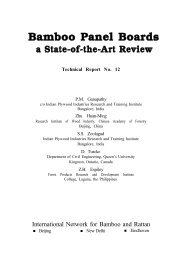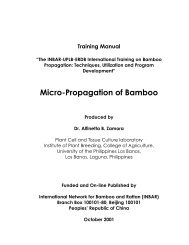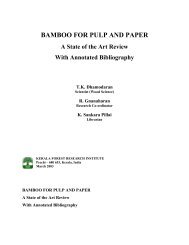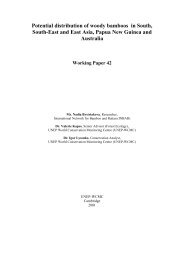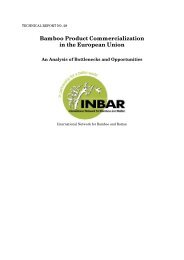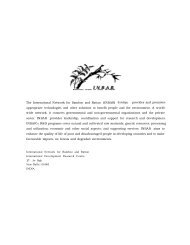The Bamboo and Rattan Sectors in Asia: an Analysis of ... - INBAR
The Bamboo and Rattan Sectors in Asia: an Analysis of ... - INBAR
The Bamboo and Rattan Sectors in Asia: an Analysis of ... - INBAR
Create successful ePaper yourself
Turn your PDF publications into a flip-book with our unique Google optimized e-Paper software.
cases, raw material is harvested by people who function, more or less, as hired labor.<br />
<strong>The</strong>y go as collectors <strong>in</strong>to forest l<strong><strong>an</strong>d</strong> over which they may have some traditional<br />
communal tenure, but the resource is currently treated more like <strong>an</strong> open-access<br />
resource. In most cases, the resource rights are held by the state <strong><strong>an</strong>d</strong> allocated to<br />
private comp<strong>an</strong>ies or <strong>in</strong>dividuals (Kalim<strong>an</strong>t<strong>an</strong>, Kerala, Laos, Sulawesi, the Philipp<strong>in</strong>es)<br />
or actually harvested by employees <strong>of</strong> the state forest department (Madhya Pradesh,<br />
Java). Most <strong>of</strong> the economic rent is captured by concessionaires or by the forest<br />
departments.<br />
Similarly, <strong>in</strong> most <strong>of</strong> the cases studied, competitive market forces appear to be<br />
constra<strong>in</strong>ed by hierarchical forces. This tendency is much more marked at the early<br />
stages <strong>of</strong> the various PCS, where raw material producers may have only one or very<br />
few buyers. A variety <strong>of</strong> <strong>in</strong>formal contract arr<strong>an</strong>gements are used, with traders<br />
commonly adv<strong>an</strong>c<strong>in</strong>g money <strong><strong>an</strong>d</strong>/or supplies to raw material harvesters <strong>in</strong> return for<br />
implicit or explicit agreement to sell to only that trader. Even at higher levels <strong>in</strong> the<br />
system, long-term personal arr<strong>an</strong>gements between bus<strong>in</strong>ess partners tend to be more<br />
import<strong>an</strong>t th<strong>an</strong> spot sales. Prices are negotiated, but price is not the most import<strong>an</strong>t<br />
factor. In the Indi<strong>an</strong> cases (Kerala <strong><strong>an</strong>d</strong> Madhya Pradesh) differential bamboo prices<br />
are set by formulas <strong><strong>an</strong>d</strong> allocated accord<strong>in</strong>g to social <strong><strong>an</strong>d</strong> political criteria.<br />
<strong>The</strong> tendency toward contract buy<strong>in</strong>g c<strong>an</strong> be expla<strong>in</strong>ed, at least <strong>in</strong> part, by the<br />
nature <strong>of</strong> the material. Most import<strong>an</strong>tly, quality is <strong>in</strong>consistent. <strong>Bamboo</strong> <strong><strong>an</strong>d</strong> ratt<strong>an</strong>,<br />
like most biological resources, are not homogenous. <strong>The</strong> size, density <strong><strong>an</strong>d</strong> other<br />
<strong>in</strong>herent characteristics import<strong>an</strong>t to consumers/users vary with species (m<strong>an</strong>y species<br />
are used), the particular genotype, as well as with age <strong><strong>an</strong>d</strong> grow<strong>in</strong>g conditions.<br />
Moreover, these commodities are perishable. As the semi-process<strong>in</strong>g <strong><strong>an</strong>d</strong><br />
m<strong>an</strong>ufactur<strong>in</strong>g processes become more mech<strong>an</strong>ized <strong><strong>an</strong>d</strong> as the m<strong>an</strong>ufacturers try to<br />
supply large orders, uniformity, consistency <strong><strong>an</strong>d</strong> on-time delivery become much more<br />
import<strong>an</strong>t. Under these conditions, it is not possible for buyers at <strong>an</strong>y stage <strong>in</strong> the<br />
PCS to simply purchase their ratt<strong>an</strong> or bamboo unseen, nor to rely on the vagaries<br />
<strong>of</strong> the market to deliver the quality <strong><strong>an</strong>d</strong> qu<strong>an</strong>tity <strong>of</strong> raw material required. It is too<br />
costly to <strong>in</strong>spect each <strong><strong>an</strong>d</strong> every consignment to determ<strong>in</strong>e the quality, <strong><strong>an</strong>d</strong> then<br />
negotiate the price. Instead buyers prefer to enter <strong>in</strong>to longer term relationships with<br />
sellers. In this approach trust <strong><strong>an</strong>d</strong> longer term (if <strong>in</strong>formal) contractual agreements<br />
c<strong>an</strong> reduce the tr<strong>an</strong>sactions costs <strong>of</strong> buy<strong>in</strong>g <strong><strong>an</strong>d</strong> sell<strong>in</strong>g. Thus, the trend toward contract<br />
buy<strong>in</strong>g is likely to be re<strong>in</strong>forced.<br />
Such long-term arr<strong>an</strong>gements are attractive also from the sellers' side. Raw<br />
material production is geographically dispersed. <strong>The</strong> wild, <strong><strong>an</strong>d</strong> even much <strong>of</strong> the<br />
cultivated, material is grown far from the process<strong>in</strong>g centers. Tr<strong>an</strong>sportation <strong><strong>an</strong>d</strong><br />
communications <strong>in</strong>frastructure is typically poor <strong>in</strong> the areas that produce the raw<br />
material. Harvesters <strong><strong>an</strong>d</strong> growers <strong>of</strong> bamboo <strong><strong>an</strong>d</strong> ratt<strong>an</strong> <strong>of</strong>ten do not have direct<br />
access to raw material buyers, <strong><strong>an</strong>d</strong> they do not have <strong>in</strong>formation (or access to<br />
<strong>in</strong>formation) on prices, quality requirements or other market <strong>in</strong>formation. For them,<br />
as <strong>in</strong>dividuals, the tr<strong>an</strong>saction costs <strong>in</strong>volved <strong>in</strong> mak<strong>in</strong>g those contracts, arr<strong>an</strong>g<strong>in</strong>g<br />
for tr<strong>an</strong>sportation <strong><strong>an</strong>d</strong> negotiat<strong>in</strong>g the sales would be far too high. <strong>The</strong> higher prices<br />
69



